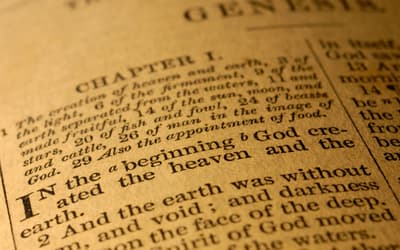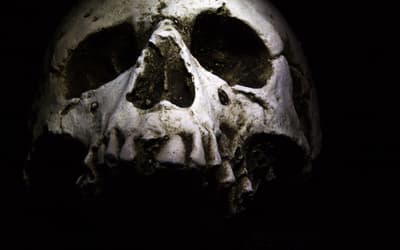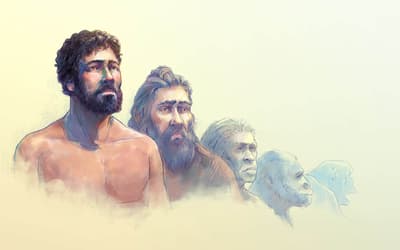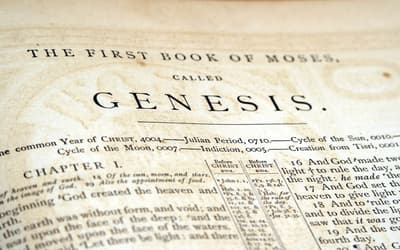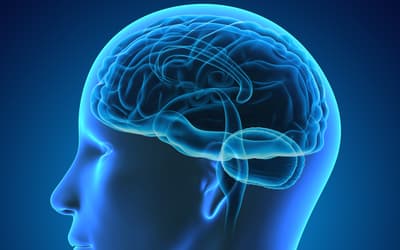The views expressed in this paper are those of the writer(s) and are not necessarily those of the ARJ Editor or Answers in Genesis.
Abstract
Certainly there is more to humans than a physical and complex brain architecture from which a mind would seem to emerge (confounding the naturalist). However, this reader has two difficulties.
Introduction
In Joubert’s paper (Joubert 2011), he successfully defends the core of his thesis, essentially, we are not our brains. Certainly there is more to humans than a physical and complex brain architecture from which a mind would seem to emerge (confounding the naturalist).
However, this reader has two difficulties:
- since the term soul is defined progressively throughout the paper, unsound implications arise when rereading earlier arguments once the full definition is in view, and
- Scriptures used to demonstrate souls are alive after death either do not imply this view or are explicitly teaching something different all together.
See Joubert’s reply to this paper.
After expanding these points, I will contend the biblical promise of resurrection strongly implies that not only are souls not alive after death but a body is necessary for a soul to interact within a realm (physical or spiritual).
The Definition of Soul
What follows is the definition of soul as it is defined progressively in Joubert (2011):
- The soul is the person and enters a disembodied state upon death (Joubert 2011, p. 217).
- Spirit and soul are interchangeable terms (Joubert 2011, p. 218).
- The soul (which is the person) has a body (Joubert 2011, p. 220).
- The soul is immaterial (Joubert 2011, p. 220).
- The soul is eternal (Joubert 2011, p. 220).
- The soul continues to exist, but more so is alive without a material body, after death (Joubert 2011, p. 221).
- The soul is an agent and the body is an instrument (Joubert 2011, p. 221).
- The soul does not change though the body does (Joubert 2011, p. 221).
- The soul is a set of capacities, attributes, tendencies, and dispositions (Joubert 2011, p. 224).
- The soul forms the body (Joubert 2011, p. 224) and when the soul comes into existence determines the body’s function (Joubert 2011, p. 226).
- The soul is the bearer of its own life (Joubert 2011, p. 226).
- The brain and the mind are not identical (Joubert 2011, p. 229).
With this summary view of soul, it seems while we may not be only our brains, we are only our souls. Based on this view, the following five problems and questions arise:
1. If the soul forms the body and the soul is the me, then why do I not have control over the formation of my body?
I currently am only aware of my control over certain muscle groups but have no control over anything else about my body, that is, heartbeats, cell growth, etc. How can my soul be the me while at the same time control the formation of my body yet I have no conscious ability to affect its functioning? Is the soul divided between conscious and subconscious?
2. What are the implications of this definition for animals since the Bible uses the same word for them as for souls referencing humans?
The Hebrew word nephesh is translated soul dozens of times in the Old Testament, but it is also used to describe animals. While God could easily create creatures with differing spiritual capacities (that is, a cow versus a human), the question is does the word nephesh translated soul have the same definition of soul as stated in Joubert (2011)?
It seems reasonable the Hebrew word would have some commonalities between humans and animals. Solomon saw a connection with the animals:
For what happens to the sons of men also happens to animals; one thing befalls them: as one dies, so dies the other. Surely, they all have one breath; man has no advantage over animals, for all is vanity. All go to one place: all are from the dust, and all return to dust. Who knows the spirit of the sons of men, which goes upward, and the spirit of the animal, which goes down to the earth? (Ecclesiastes 3:19–21).
Joubert mentions three interrelated beliefs of a theistic evolutionist, including they believe the soul is not something which sets human beings apart from animal. Stated later, “When creation is viewed as the product of an intelligent Creator/Designer, then these arguments disappear” (Joubert 2011, p. 222). While this statement might satisfy theistic evolutionists as proof, the larger concern is how does Joubert’s definition of soul draw any difference to the souls of animals?
Stated another way; if we use Joubert’s definition of soul to describe animals, then isn’t the whole definition valid for them as well? That is, if a soul determines the body’s function in an animal as well, wouldn’t the animal’s soul also continue to exist in a disembodied state after its death?
3. If we are our souls, and our souls are eternal already, then what were we before we were conceived (since Christ alone was preexistent)?
A number of Joubert’s arguments implying we are only our souls further imply we must be a complete personality from the beginning of our existence. For example, he states a person, James, gains his humanness at conception. Agreed, however, what is James as a personality at that point? Is he recognizable as a personality? While his body has not developed into an agent capable of him interacting with the world, if he were to die at this early stage of physical development, what is he really? According to Joubert, it seems James’ soul would have to be a complete personality (that is, being able to think, communicate, able to be disembodied at the end of his life, etc.) at conception, which implies that he would have to have existed prior to conception. Since we accept Christ alone was preexistent to his birth (John 1:1, 18), this aspect cannot be true.
4. If only our bodies change over time and our souls do not, then where does knowledge and learning reside?
Joubert mentions in order for a person to maintain humanness, there must be something which stays constant over time. He says the body will change, but the soul will not. If that is true, then when one learns a fact and remembers it, where does that information stay?
If the brain is responsible for storing knowledge, then when the brain dies, what is the soul after death if it didn’t change (what was it before birth)? Conversely, if knowledge is stored in the soul, then the soul changes over time (and the brain’s function would seem to be to simply regulating bodily systems).
Additionally, how does this square with the observation that people learn at different rates, have different intelligence levels, or can be subject to personality shifts through brain disorders or brain injuries? Are these physical abnormalities merely distorting the interface our souls have with the physical world?
5. If we are our souls, and our souls enter an alive, disembodied state after death (and are eternal) what is the purpose of a resurrection, let alone a resurrection body?
One of the cruxes of our hope in Jesus is that we will be resurrected. I will discuss this further at the end, however if a soul is a complete, aware entity upon death, there is no purpose in receiving a spiritual body any time after. What benefits would a new spirit body give a soul which is already alive, eternal, and existing? There must be a disadvantage at death in order for there to be any power in the promise of resurrection. When there is so much focus on resurrection by so many authors in the Bible, this must be a substantial promise to overcome a significant loss like death.
Exegesis on the Bible references used in the paper to show aliveness after death
There is a Scripture which is not only topical, but also appropriate as we seek truth:
For the word of God is living and powerful, and sharper than any two-edged sword, piercing even to the division of soul and spirit, and of joints and marrow, and is a discerner of the thoughts and intents of the heart (Hebrews 4:12).
There are several verses in Joubert (2011) which don’t support some of the conclusions drawn regarding the aliveness of the soul after death. The context of these verses show the Bible authors were not proving aliveness after death (while yet before resurrection), but in many cases they were proving another point all together.
Joubert states on page 221, “Without the soul (or
spirit) the body becomes a corpse. In the words of
the apostle James: ‘. . . the body without the spirit is
dead . . .
’ (James 2:26)” by which he gives four points,
three before a conclusion and one after (Scriptures
below come from the paper):
- Scripture reveals that it is either the soul or the spirit that departs at death, never both (cf. Genesis 35:18 with Luke 12:20, and 1 Kings 17:17, 21 with Psalm 31:5 and Matthew 27:50).
- Nowhere in Scripture does that order appear in reversed form. It is the body that is dead without the soul, and not the soul without the body.
- The soul/spirit returns to the Lord who gave it, and the body returns to the earth from which it was created and formed (Genesis 2:7; Ecclesiastes 12:7).
He then concludes:
It would therefore be simply wrong to think that the soul/spirit do not continue to live after the death or destruction of the body, which means that the soul is capable of entering an intermediate disembodied state between death and its final reunion with a resurrection body (Joubert 2011, p. 221).
There is nothing in those three points (or Scriptures) which allows us to imply anything more than there is a spiritual part of man, and God holds that part after death. None of the Scriptures supporting those points speaks of or implies aliveness/awareness/disembodiment after death. To be clear: disembodiment is not the same as separable. The spirit is demonstrated as separable from the body but this does not imply it is an aware person, just without a body. I’d like to explore these three points further:
The first point; earlier Joubert defines soul and spirit as interchangeable (Joubert 2011, p. 218, footnote 1). While the verses in the footnote seem to show this, Hebrews 4:12, above, opens the possibility for soul and spirit to be divided. Additionally, there are a number of Hebrew and Greek words translated throughout the Bible as “soul,” “spirit,” “breath,” “life,” etc. and it seems inconclusive to fall on one side or the other without deeper investigation and study. For now, James says spirit and not soul (assuming the definition of soul by Joubert [2011]). Of course, James says nothing about the spirit being aware without a body. Simply, the body is dead without a spirit.
The second point; while I agree regarding the order, this statement says nothing about the spirit being a conscious entity after death. James does not granularly define the soul as the person, but speaks of how the body is dependent on the spirit, just like faith is dependent on manifesting works. Only together are they completely functioning. In fact, James’ point is focused on the validity of faith through works and uses the body-spirit example to validate his position.
The third point; James 2:26 is the reverse of Genesis 2:7. Where the body without the spirit is dead, in Genesis the body plus the breath of life is a living soul. God breathed the breath of life into Adam to become a living soul. He did not breathe into him a soul. Further, we can assume Adam as an inward man did not exist until he became a living soul, that is, he was not a disembodied soul prior to his body which God placed into his outward man (however Adam was created mature in both respects). Ecclesiastes 12:7 clearly mentions the dissolving of the two parts (as we also saw in James 2:26) and where they go, but neither of these verses have any implication there is awareness of the inward man once outside a body in death.
So, it is not simply wrong to conclude the spirit continues to exist as a disembodied state after death—there is simply no indication from these verses by which we can conclude it.
Following Joubert’s conclusion, he mentions in reference to Matthew 22:29–32, “It is a claim, in other words, that Jesus only could have made if Abraham, Isaac, and Jacob were alive, if they had continued to exist after their bodily death on earth” (Joubert 2011, p. 221). This conclusion is erroneous because it is out of context and not what Jesus was teaching.
Matthew 22:23–32, Mark 12:18–27, and Luke 20:27–38
are all parallel verses of this account. The
focus is around the Sadducees and their non-belief in
a resurrection. They pose an unlikely, hypothetical
situation about whose wife a woman married multiple
times would be in the resurrection. Jesus tells them
there is no marriage in the resurrection. Then, to
drive home his point, he says, “But concerning the
resurrection of the dead, have you not read what
was spoken to you by God, saying, ‘I am the God of
Abraham, the God of Isaac, and the God of Jacob’?
God is not the God of the dead, but of the living
”
(Matthew 22:31–32, emphasis added).
Jesus says this in context of the resurrection (v. 31a).
Since Abraham, Isaac, and Jacob will receive spiritual
bodies and eternal life at the resurrection, they are as
good as alive from God’s perspective. God is not the
God of the dead because there is a resurrection. God
is the God of the living because there is a resurrection.
The Luke account makes this even clearer, “But even
Moses showed in the burning bush passage that the
dead are raised, when he called the Lord ‘the God of
Abraham, the God of Isaac, and the God of Jacob.’ For
He is not the God of the dead but of the living, for all
live to Him
” (Luke 20:37–38, emphasis added).
When Joubert says, “Jesus therefore corrected their mistaken assumption,” their mistaken assumption was they believed there was no resurrection (v. 23). It was not that Abraham, Isaac, and Jacob were currently alive as disembodied souls as Joubert concludes. Jesus said they erred not knowing the Scripture, then gave them Exodus 3:6. This further implies that those who knew the Scriptures as far back as Moses could have known about resurrection from this verse. Jesus said they erred not knowing the power of God by not believing in resurrection which was a main tenet of their position. The power of God is to resurrect.
After this, Joubert makes a fourth point;
He [Peter] informed us that Jesus went to proclaim the gospel of the new life in Him to those whose bodies perished during Noah’s Flood (1 Peter 3:18–21, 4:6). Not only were they—Jesus and those that perished—alive, but they had been alive without material bodies. It is therefore consistent for Paul to have said that, “
. . . He also first descended[into the lower parts of the earth]. . . is also the One who ascended far above all the heavens . . .” (Ephesians 4:9–10).
There are two points here: the Ephesians reference does not support Joubert’s statement, and there is more to the 1 Peter reference which shows it is not supportive, either.
Regarding the Ephesians reference; the King
James wording does seem awkward: “Now that he
ascended, what is it but that he also descended first
into the lower parts of the earth? He that descended is
the same also that ascended up far above all heavens,
that he might fill all things
”. Is Paul’s purpose in
writing this to teach the Ephesians that Jesus was
alive without a material body and descended into
Hades after his death, as Joubert claims? No.
In looking at the context, Paul is explaining to the
Ephesians about the gift of grace, and that Christ was
God. In verses 7 and 8 he says, “But to each one of us
grace was given according to the measure of Christ’s
gift. Therefore He says: ‘When He ascended on high, He
led captivity captive, And gave gifts to men’
”. Paul then
makes a parenthetical statement (vv. 9–10) explaining
this quotation. Essentially he’s saying, in order for
Christ to ascend and reward us with grace, he must
have first had to descend to earth. That is, Christ came
from heaven and not from earth (paralleling what
Jesus himself said in John 3:13, “No one has ascended
to heaven but He who came down from heaven, that is,
the Son of Man who is in heaven.
”).
The phrase, “lower parts of the earth,” contrasts
with, “
far above all the heavens
”. That phrase in some
other translations seems to clarify this intent and not
that Jesus went to Hades, but rather he came to earth
from heaven (the alternative is that Christ was simply
born a man and became God, which is false by John 3:13,
and what Paul was explaining against):
- “
also descended into the lower regions, the earth?
” (English Standard Version). - “
also descended to the lower regions, namely, the earth?
” (New English Translation).
Regarding the 1 Peter references; the only way these verses indicate Christ preached to dead people alive as disembodied souls are if it is presupposed. 1 Peter 4:6 as referenced in Joubert (2011) implies those dead were allowed to be saved, even though they were dead. If this is true, then it implies the possibility for universalism—that all will be saved eventually. This is not true because it violates a main tenet of Scripture, but there is an even plainer meaning from the context.
Peter has just finish speaking in verses 1–4 about
how we used to be involved with worldly sinful
activities and how our friends look at us now and
wonder why we won’t go along with them anymore in
those activities. In verse 5 he says that everyone will
answer to God. Then he says this is why the gospel
was preached to those who are dead. That is, those
who are dead now were once alive before you were
alive, but have since died. They heard the gospel when
they were alive, and were in the same circumstances
for their faith as you are, but then they died. They
died because they were judged in the flesh (“. . . it is
appointed for men to die once . . .
” [Hebrews 9:27]), but
they were able to live according to God in the spirit
(vv. 3–4) while they were alive.
Backing up further to 1 Peter 3:18–21 there are
two points; it is difficult to see how this verse shows
Jesus was alive during the three days and three
nights he was in the grave. Verse 18 strongly implies
that Jesus was resurrected before his preaching:
“. . . being put to death in the flesh, but made alive by
the Spirit.
” It was this sequence, the dying and the
quickening (resurrection) by the Spirit “by whom also
He went and preached . . .
” (v. 19, emphasis added).
Since he was resurrected three days and three nights
after his death, the preaching happened after his
resurrection.
Regarding whether the “spirits in prison
” were
people alive after death; because Joubert presumes
the spirits in prison are people, the first curiosity is
this would only represent a small subset of people in
history between Adam and Jesus (the verse describes
this group as being “disobedient
” while God “waited
in the days of Noah
” (vv. 19–20). Even if one included
everyone who died from Adam to Noah in this group,
it certainly excludes everyone from Noah to Jesus. So
the question is why would Peter pinpoint only a small
group of people who ever died in order to strengthen
his point regarding the suffering of Christ for all
mankind? Additionally, why would Jesus preach to
such a small group of dead people to proclaim this, as
Joubert concludes?
The second curiosity is in the phrase, “spirits in
prison
”. While this might be poetic language referring
to dead people, a clue to unraveling this is in the word
prison. Doing a search on the Greek word behind it
reveals 45 uses elsewhere in the New Testament. In
42 uses it is speaking of people in a physical prison
or the act of watching as of a prison guard. The other
three uses appear in: this verse, Revelation 18:2, and
Revelation 20:7. The verses in Revelation speak of
prison in reference to “foul spirits” and Satan. Since
prison is used to refer to physical people or demons/Satan,
it is a leap to say the “spirits in prison
” here
are indeed people who have died. It is more likely they
are fallen angels who did something disobedient in
the days of Noah, and which Jesus is triumphantly
proclaiming his overcoming to them.
We could continue to solidly explore this line of reasoning and address these curiosities further, but it would take more space than we have here (the additional thread of these being fallen angels and not people are in 2 Peter 2:4, Jude 6, and Genesis 6:2, 4). My primary point is to show that 1 Peter 3:18–21 is not conclusively demonstrating people are alive after death. That implication is weak based on these curiosities and other plausible alternatives.
Joubert continues in the paper by stating Jesus
could not be identical to his body because his body
changed state (Joubert 2011, p. 221). Agreed, Jesus
was not only his body. He later states, “the writer of
the letter to the Hebrews could not have stated, ‘Jesus
Christ is the same yesterday, today, and forever
’
(Hebrews 13:8). If it is true of Jesus, then it must
be true of us, for He was a complete human being”
(Joubert 2011, p. 221). While it is true Jesus was a
complete human being, He was also completely God,
which none of us are. It’s only by way of this God-human
hybrid (a complete hybrid, not just half-and-half)
that his death is able to cover our sins. None of
us can make the claim of preexistence the way Jesus
did to the Jews: “Then the Jews said to Him, ‘You are
not yet fifty years old, and have You seen Abraham?’
Jesus said to them, ‘Most assuredly, I say to you, before
Abraham was, I AM’
” (John 8:57–58). The Hebrews
verse actually more strongly implies something we
are not, namely preexistent nor inherently immortal
(nor consistent, even day to day).
Resurrection the key
The key point of disagreement regarding Joubert’s definition of soul is the statement the spirit of a person lives on in a disembodied state after death and is therefore able to interact in the spirit world. This point hangs on the scriptural promise of resurrection, which strongly implies Joubert’s statement cannot be. As we have seen in the Scriptures above, there is clearly a spirit in man which God preserves after death, yet it is only with a body that the soul has interactivity with the world around it. I hold that our bodies and souls together (whether that body is physical or spiritual) make up a whole person. We are whole with a physical body, and we will be whole again with a spiritual body. While separable, they are not functionally independent when separated.
If there is functional independence as an immaterial entity without a body, then there is no purpose, or power, in the promise of resurrection since a resurrected body provides nothing a disembodied soul doesn’t already possess. To give a soul a spiritual body is to be redundant. Yet resurrection is one of the greatest promises, and greatest hopes, in the Bible. There must be power in the promise, which means there must be some great disadvantage at death.
Resurrection is the crux of the issue of life after death and strongly implies the nature of the soul. As Christians, because we believe Jesus died and rose again, we have hope in the promise of resurrection, not in the act of dying or in death. That is to say, death is not something we look forward to so our souls will finally be free of our bodies. Death is a horrid, horrid penalty for sin while everlasting life in an immortal spirit body is a wonderful, glorious gift. Here are some Scriptures with comments:
But I do not want you to be ignorant, brethren, concerning those who have fallen asleep, lest you sorrow as others who have no hope. . . . Therefore comfort one another with these words (1 Thessalonians 4:13, 18).
Paul does not tell the Thessalonians to comfort each other that their saved loved ones are alive in heaven now, as comforting as that may seem (and what is said at many Christian funerals). The resurrection is to be the basis of their hope and comfort.
Jesus said to her, “Your brother will rise again.” Martha said to Him, “I know that he will rise again in the resurrection at the last day” (John 11:23–24).
Martha does not respond with, “What do you mean ‘rise again’? He’s safe in Abraham’s bosom.” She stands on the promise of resurrection for her hope and comfort (and this occurred before Paul wrote 1 Thessalonians). It is almost certain she knew this from Exodus 3:6.
In the most incredible show of faith, Jesus put all his hope that God would resurrect him as promised:
And when Jesus had cried out with a loud voice, He said, “Father, ‘into Your hands I commit My spirit’.” Having said this, He breathed His last (Luke 23:46).
Jesus did not mention he was going to see the Father after his death. This statement was a show of faith that God would fulfill the promise of resurrection (that is, the power of God). Committing his spirit into God’s hands implies that Jesus gave over his spirit to whatever God would do with it (Matthew 10:28). Since God fulfills his promises, he resurrected Jesus, yet it was still an act of faith on Jesus’ part.
Men and brethren, let me speak freely to you of the patriarch David, that he is both dead and buried, and his tomb is with us to this day. Therefore, being a prophet, and knowing that God had sworn with an oath to him that of the fruit of his body, according to the flesh, He would raise up the Christ to sit on his throne, he, foreseeing this, spoke concerning the resurrection of the Christ, that His soul was not left in Hades, nor did His flesh see corruption. This Jesus God has raised up, of which we are all witnesses. Therefore being exalted to the right hand of God, and having received from the Father the promise of the Holy Spirit, He poured out this which you now see and hear. “For David did not ascend into the heavens, but he says himself: ‘The Lord said to my Lord, “Sit at My right hand, Till I make Your enemies Your footstool.”’ Therefore let all the house of Israel know assuredly that God has made this Jesus, whom you crucified, both Lord and Christ (Acts 2:29–36, emphasis added).
The Jews reading the Psalms did not make the connection David was a prophet, but rather thought he spoke of himself in those verses. However, Peter emphasizes that David is not only currently dead, but he is also not resurrected nor has he ascended to heaven. If all those conditions are true of David, he must be in some other state. Additionally, it should be true of all of us else since David was just a man. Only Jesus qualifies as having been dead, resurrected, and ascended.
For if we have been united together in the likeness of His death, certainly we also shall be in the likeness of His resurrection, knowing this, that our old man was crucified with Him, that the body of sin might be done away with, that we should no longer be slaves of sin. For he who has died has been freed from sin. Now if we died with Christ, we believe that we shall also live with Him, knowing that Christ, having been raised from the dead, dies no more. Death no longer has dominion over Him (Romans 6:5–9, emphasis added).
Resurrection is so powerful, that without it there is no freedom from death. However, given Joubert’s definition of soul, people who die are already freed from death for eternity. That view undermines this verse, since in order to be resurrected you must have lost something (life) and be brought back to something (new life). Only God promises a resurrection to either life or judgment from the state of death. In 1 Corinthians 15 we read (with emphasis added):
Now if Christ is preached that He has been raised from the dead, how do some among you say that there is no resurrection of the dead? But if there is no resurrection of the dead, then Christ is not risen. And if Christ is not risen, then our preaching is empty and your faith is also empty (vv. 12–14).
But now Christ is risen from the dead, and has become the firstfruits of those who have fallen asleep. For since by man came death, by Man also came the resurrection of the dead. For as in Adam all die, even so in Christ all shall be made alive. But each one in his own order: Christ the firstfruits, afterward those who are Christ’s at His coming (vv. 20–23).
But someone will say, “How are the dead raised up? And with what body do they come?” (v. 35).
So also is the resurrection of the dead. The body is sown in corruption, it is raised in incorruption. It is sown in dishonor, it is raised in glory. It is sown in weakness, it is raised in power. It is sown a natural body, it is raised a spiritual body. There is a natural body, and there is a spiritual body. And so it is written, “The first man Adam became a living being.” The last Adam became a life-giving spirit (vv. 42–45).
Now this I say, brethren, that flesh and blood cannot inherit the kingdom of God; nor does corruption inherit incorruption. Behold, I tell you a mystery: We shall not all sleep, but we shall all be changed—in a moment, in the twinkling of an eye, at the last trumpet. For the trumpet will sound, and the dead will be raised incorruptible, and we shall be changed. For this corruptible must put on incorruption, and this mortal must put on immortality. So when this corruptible has put on incorruption, and this mortal has put on immortality, then shall be brought to pass the saying that is written: “Death is swallowed up in victory.” “O Death, where is your sting? O Hades, where is your victory?” The sting of death is sin, and the strength of sin is the law. But thanks be to God, who gives us the victory through our Lord Jesus Christ (vv. 50–57).
It is not enough that Christ died. If it was, we would enter into our promise at death. The Corinthians were guilty of the same error as the Sadducees—saying there was no resurrection. Paul is describing not only the new body believers will receive, but also the necessity of having a spiritual, glorified, powerful, incorruptible, immortal body to enter into the kingdom. Additionally, not just those alive at Christ’s coming will receive new bodies, but those who are dead will come back to life with these new bodies. Whereas people who are alive who are transformed, people who are dead are resurrected. Dead people’s spirits simply cannot be in a spiritual, glorified, powerful, incorruptible, immortal state after death because this is what they become at their resurrection. If a person’s spirit is these things already, then what is the purpose of a body like this?
A brief expansion
With the description of the resurrected body and the corollary that dead spirits do not receive this new body until Christ returns, we can see where Paul was coming from when he told the Corinthians in his next letter to them:
For we know that if our earthly house, this tent, is destroyed, we have a building from God, a house not made with hands, eternal in the heavens. For in this we groan, earnestly desiring to be clothed with our habitation which is from heaven, if indeed, having been clothed, we shall not be found naked. For we who are in this tent groan, being burdened, not because we want to be unclothed, but further clothed, that mortality may be swallowed up by life. Now He who has prepared us for this very thing is God, who also has given us the Spirit as a guarantee. So we are always confident, knowing that while we are at home in the body we are absent from the Lord. For we walk by faith, not by sight. We are confident, yes, well pleased rather to be absent from the body and to be present with the Lord (2 Corinthians 5:1–8, emphasis added).
Paul just finished saying we look forward to the
spiritual, glorified, powerful, incorruptible, immortal
body so we will not be found naked after leaving this
earthly body. He specifically says that we groan,
“. . . not because we want to be unclothed, but further
clothed
” (v. 4), that is, we do not wish to simply be rid
of this earthly body, but so we can put on our spiritual
body. Then he says we would be willing rather to be
absent from the body and present with the Lord. Given
1 Corinthians 15, we cannot be spiritually clothed
until Christ returns, and by this verse we cannot be
found naked immediately after death. According to
Joubert’s definition of soul, when we die we would
be unclothed and immediately in the presence of
the Lord after death. Paul shows these as mutually
exclusive. Paul skips the period of time between death
and being clothed with our spiritual body, but they
run together as one event. How can this be?
There must be a gap between our death experience
and our resurrection experience. This is not unusual
at all to imagine since we experience a similar event
every night. When we sleep at night, it seems almost
immediately the alarm rings even though eight hours
(more or less) have elapsed. The same is with the
dead. Dead people’s spirits are in a state of sleep until
the resurrection (as Paul says, “. . . We shall not all
sleep, . . .
” [1 Corinthians 15:51]).
But if the Spirit of Him who raised Jesus from the dead dwells in you, He who raised Christ from the dead will also give life to your mortal bodies through His Spirit who dwells in you (Romans 8:11).
What makes this even more striking is the notion if Jesus wasn’t really dead (that is, his spirit in a state of sleep, not a disembodied state) for three days and three nights, then his coming back from the dead was merely a formality and the promise of resurrection is mere formality. Jesus didn’t raise himself from the dead; it was “the Spirit of him” that raised Jesus. It was the power of God, and it is this power that Jesus spoke of and of which He promises to use to raise us up if we believe.
Conclusion
Joubert’s definition of soul which includes aliveness after death creates a number of issues within his own examples. Soul may be a familiar term, but its familiarity does not mean it has a common meaning—even at first glance the Bible seems to mix the terms spirit and soul (knowing Scripture is God-breathed, this means we need to dig deeper). These differences in meaning makes studying the topic challenging, and finding a universal, biblical definition is paramount.
Additionally, similar to how one’s worldview affects one’s interpretation of origin science, so is one’s understanding of resurrection on the implications of what happens after people die. 1 Corinthians 15 is the cornerstone from which all other post-mortem Scriptures can be built upon. By describing the properties, timing, and promise of the resurrection body, Paul strongly implies these properties cannot be that of dead people’s spirits. Namely, if dead people’s spirits already possess these properties at death, then a resurrection into a new body of identical properties later at Christ’s return is moot, making the promise of none effect.
Given the Bible’s focus on resurrection as our hopeful promise, this view should be considered as we search the Scriptures to see if this is so (Acts 17:10–11). From here, there are numerous life-after-death Scriptures which should be studied with this view in mind, but that will require additional prayer, time, and space.
References
Joubert, C. 2011. What Makes Us Human, and Why It Is Not the Brain: A Creationist Defense of the Soul Answers Research Journal 4:217–232.





